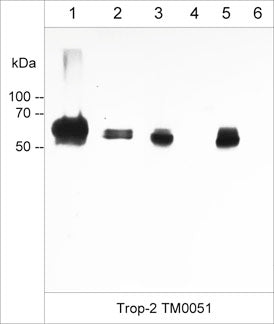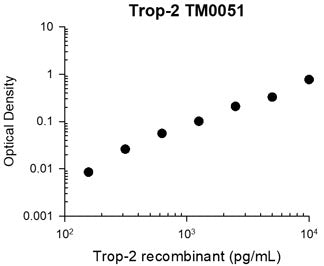Anti-Trop-2/TACSTD2 (Extracellular region) Antibody
- SPECIFICATION
- CITATIONS
- PROTOCOLS
- BACKGROUND

Application
| WB, IHC |
|---|---|
| Primary Accession | P09758 |
| Host | Mouse |
| Clonality | Mouse Monoclonal |
| Isotype | IgG1 |
| Clone Names | M005 |
| Calculated MW | 35709 Da |
| Gene ID | 4070 |
|---|---|
| Other Names | Tumor-associated calcium signal transducer 2; Trop-2; Membrane component chromosome 1 surface marker 1; GA733-1; TACSTD2; M1S1; TROP2 |
| Dilution | WB~~1:1000 IHC~~1:100~500 |
| Storage | Maintain refrigerated at 2-8°C for up to 6 months. For long term storage store at -20°C in small aliquots to prevent freeze-thaw cycles. |
| Precautions | Anti-Trop-2/TACSTD2 (Extracellular region) Antibody is for research use only and not for use in diagnostic or therapeutic procedures. |
| Shipping | Blue Ice |

Thousands of laboratories across the world have published research that depended on the performance of antibodies from Abcepta to advance their research. Check out links to articles that cite our products in major peer-reviewed journals, organized by research category.
info@abcepta.com, and receive a free "I Love Antibodies" mug.
Provided below are standard protocols that you may find useful for product applications.
Background
Trop-2 (TACSTD2) is a transmembrane glycoprotein found on invasive trophoblast cells and in several epithelial type cancer cells. Trop-2 has an extracellular domain with EGF thyroglobulin type-1 repeats, a transmembrane domain and a short cytoplasmic tail with a HIKE domain containing a PIP2 binding site. This glycoprotein functions in many signaling pathways including interaction of its extracellular domain with integrin β1 to regulate FAK signaling, interaction of its transmembrane domain with claudin 1 and claudin 7 during tight junction formation, and regulation of intracellular calcium release by its PIP2 binding and activation of the ERK/MAPK pathway. These Trop-2 functions may be important during tumor proliferation, metastasis and invasion.
If you have used an Abcepta product and would like to share how it has performed, please click on the "Submit Review" button and provide the requested information. Our staff will examine and post your review and contact you if needed.
If you have any additional inquiries please email technical services at tech@abcepta.com.













 Foundational characteristics of cancer include proliferation, angiogenesis, migration, evasion of apoptosis, and cellular immortality. Find key markers for these cellular processes and antibodies to detect them.
Foundational characteristics of cancer include proliferation, angiogenesis, migration, evasion of apoptosis, and cellular immortality. Find key markers for these cellular processes and antibodies to detect them. The SUMOplot™ Analysis Program predicts and scores sumoylation sites in your protein. SUMOylation is a post-translational modification involved in various cellular processes, such as nuclear-cytosolic transport, transcriptional regulation, apoptosis, protein stability, response to stress, and progression through the cell cycle.
The SUMOplot™ Analysis Program predicts and scores sumoylation sites in your protein. SUMOylation is a post-translational modification involved in various cellular processes, such as nuclear-cytosolic transport, transcriptional regulation, apoptosis, protein stability, response to stress, and progression through the cell cycle. The Autophagy Receptor Motif Plotter predicts and scores autophagy receptor binding sites in your protein. Identifying proteins connected to this pathway is critical to understanding the role of autophagy in physiological as well as pathological processes such as development, differentiation, neurodegenerative diseases, stress, infection, and cancer.
The Autophagy Receptor Motif Plotter predicts and scores autophagy receptor binding sites in your protein. Identifying proteins connected to this pathway is critical to understanding the role of autophagy in physiological as well as pathological processes such as development, differentiation, neurodegenerative diseases, stress, infection, and cancer.



